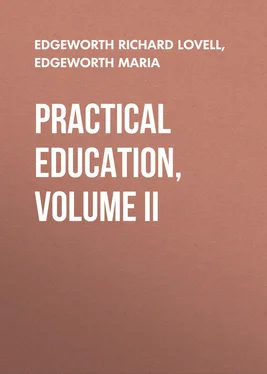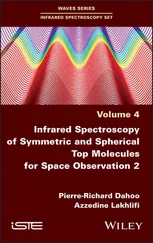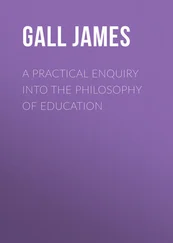Richard Edgeworth - Practical Education, Volume II
Здесь есть возможность читать онлайн «Richard Edgeworth - Practical Education, Volume II» — ознакомительный отрывок электронной книги совершенно бесплатно, а после прочтения отрывка купить полную версию. В некоторых случаях можно слушать аудио, скачать через торрент в формате fb2 и присутствует краткое содержание. Жанр: Прочая научная литература, foreign_edu, foreign_antique, foreign_prose, на английском языке. Описание произведения, (предисловие) а так же отзывы посетителей доступны на портале библиотеки ЛибКат.
- Название:Practical Education, Volume II
- Автор:
- Жанр:
- Год:неизвестен
- ISBN:нет данных
- Рейтинг книги:3 / 5. Голосов: 1
-
Избранное:Добавить в избранное
- Отзывы:
-
Ваша оценка:
- 60
- 1
- 2
- 3
- 4
- 5
Practical Education, Volume II: краткое содержание, описание и аннотация
Предлагаем к чтению аннотацию, описание, краткое содержание или предисловие (зависит от того, что написал сам автор книги «Practical Education, Volume II»). Если вы не нашли необходимую информацию о книге — напишите в комментариях, мы постараемся отыскать её.
Practical Education, Volume II — читать онлайн ознакомительный отрывок
Ниже представлен текст книги, разбитый по страницам. Система сохранения места последней прочитанной страницы, позволяет с удобством читать онлайн бесплатно книгу «Practical Education, Volume II», без необходимости каждый раз заново искать на чём Вы остановились. Поставьте закладку, и сможете в любой момент перейти на страницу, на которой закончили чтение.
Интервал:
Закладка:
CHAPTER XVII
Parents are anxious that children should be conversant with Mechanics, and with what are called the Mechanic Powers. Certainly no species of knowledge is better suited to the taste and capacity of youth, and yet it seldom forms a part of early instruction. Every body talks of the lever, the wedge, and the pulley, but most people perceive, that the notions which they have of their respective uses, are unsatisfactory, and indistinct; and many endeavour, at a late period of life, to acquire a scientific and exact knowledge of the effects that are produced by implements which are in every body's hands, or that are absolutely necessary in the daily occupations of mankind.
An itinerant lecturer seldom fails of having a numerous and attentive auditory; and if he does not communicate much of that knowledge which he endeavours to explain, it is not to be attributed either to his want of skill, or to the insufficiency of his apparatus, but to the novelty of the terms which he is obliged to use. Ignorance of the language in which any science is taught, is an insuperable bar to its being suddenly acquired; besides a precise knowledge of the meaning of terms, we must have an instantaneous idea excited in our minds whenever they are repeated; and, as this can be acquired only by practice, it is impossible that philosophical lectures can be of much service to those who are not familiarly acquainted with the technical language in which they are delivered; and yet there is scarcely any subject of human inquiry more obvious to the understanding, than the laws of mechanics. Only a small portion of geometry is necessary to the learner, if he even wishes to become master of the more difficult problems which are usually contained in a course of lectures, and most of what is practically useful, may be acquired by any person who is expert in common arithmetic.
But we cannot proceed a single step without deviating from common language; if the theory of the balance, or the lever, is to be explained, we immediately speak of space and time . To persons not versed in literature, it is probable that these terms appear more simple and unintelligible than they do to a man who has read Locke, and other metaphysical writers. The term space to the bulk of mankind, conveys the idea of an interval; they consider the word time as representing a definite number of years, days, or minutes; but the metaphysician, when he hears the words space and time , immediately takes the alarm, and recurs to the abstract notions which are associated with these terms; he perceives difficulties unknown to the unlearned, and feels a confusion of ideas which distracts his attention. The lecturer proceeds with confidence, never supposing that his audience can be puzzled by such common terms. He means by space , the distance from the place whence a body begins to fall, to the place where its motion ceases; and by time, he means the number of seconds, or of any determinate divisions of civil time which elapse from the commencement of any motion to its end; or, in other words, the duration of any given motion. After this has been frequently repeated, any intelligent person perceives the sense in which they are used by the tenour of the discourse; but in the interim, the greatest part of what he has heard, cannot have been understood, and the premises upon which every subsequent demonstration is founded, are unknown to him. If this be true, when it is affirmed of two terms only, what must be the situation of those to whom eight or ten unknown technical terms occur at the commencement of a lecture? A complete knowledge, such a knowledge as is not only full, but familiar, of all the common terms made use of in theoretic and practical mechanics, is, therefore, absolutely necessary before any person can attend public lectures in natural philosophy with advantage.
What has been said of public lectures, may, with equal propriety, be applied to private instruction; and it is probable, that inattention to this circumstance is the reason why so few people have distinct notions of natural philosophy. Learning by rote, or even reading repeatedly, definitions of the technical terms of any science, must undoubtedly facilitate its acquirement; but conversation, with the habit of explaining the meaning of words, and the structure of common domestic implements, to children, is the sure and effectual method of preparing the mind for the acquirement of science.
The ancients, in learning this species of knowledge, had an advantage of which we are deprived: many of their terms of science were the common names of familiar objects. How few do we meet who have a distinct notion of the words radius, angle, or valve. A Roman peasant knew what a radius or a valve meant, in their original signification, as well as a modern professor; he knew that a valve was a door, and a radius a spoke of a wheel; but an English child finds it as difficult to remember the meaning of the word angle, as the word parabola. An angle is usually confounded, by those who are ignorant of geometry and mechanics, with the word triangle, and the long reasoning of many a laborious instructer has been confounded by this popular mistake. When a glass pump is shown to an admiring spectator, he is desired to watch the motion of the valves: he looks "above, about, and underneath;" but, ignorant of the word valve , he looks in vain. Had he been desired to look at the motion of the little doors that opened and shut, as the handle of the pump was moved up and down, he would have followed the lecturer with ease, and would have understood all his subsequent reasoning. If a child attempts to push any thing heavier than himself, his feet slide away from it, and the object can be moved only at intervals, and by sudden starts; but if he be desired to prop his feet against the wall, he finds it easy to push what before eluded his little strength. Here the use of a fulcrum, or fixed point, by means of which bodies may be moved, is distinctly understood. If two boys lay a board across a narrow block of wood, or stone, and balance each other at the opposite ends of it, they acquire another idea of a centre of motion. If a poker is rested against a bar of a grate, and employed to lift up the coals, the same notion of a centre is recalled to their minds. If a boy, sitting upon a plank, a sofa, or form, be lifted up by another boy's applying his strength at one end of the seat, whilst the other end of the seat rests on the ground, it will be readily perceived by them, that the point of rest, or centre of motion, or fulcrum, is the ground, and that the fulcrum is not, as in the first instance, between the force that lifts, and the thing that is lifted; the fulcrum is at one end, the force which is exerted acts at the other end, and the weight is in the middle. In trying, these simple experiments, the terms fulcrum , centre of motion , &c. should be constantly employed, and in a very short time they would be as familiar to a boy of eight years old as to any philosopher. If for some years the same words frequently recur to him in the same sense, is it to be supposed that a lecture upon the balance and the lever would be as unintelligible to him as to persons of good abilities, who at a more advanced age hear these terms from the mouth of a lecturer? A boy in such circumstances would appear as if he had a genius for mechanics, when, perhaps, he might have less taste for the science, and less capacity, than the generality of the audience. Trifling as it may at first appear, it will not be found a trifling advantage, in the progress of education, to attend to this circumstance. A distinct knowledge of a few terms, assists a learner in his first attempts; finding these successful, he advances with confidence, and acquires new ideas without difficulty or disgust. Rousseau, with his usual eloquence, has inculcated the necessity of annexing ideas to words; he declaims against the splendid ignorance of men who speak by rote, and who are rich in words amidst the most deplorable poverty of ideas. To store the memory of his pupil with images of things, he is willing to neglect, and leave to hazard, his acquirement of language. It requires no elaborate argument to prove that a boy, whose mind was stored with accurate images of external objects, of experimental knowledge, and who had acquired habitual dexterity, but who was unacquainted with the usual signs by which ideas are expressed, would be incapable of accurate reasoning, or would, at best, reason only upon particulars. Without general terms, he could not abstract; he could not, until his vocabulary was enlarged, and familiar to him, reason upon general topics, or draw conclusions from general principles: in short, he would be in the situation of those who, in the solution of difficult and complicated questions relative to quantity, are obliged to employ tedious and perplexed calculations, instead of the clear and comprehensive methods that unfold themselves by the use of signs in algebra.
Читать дальшеИнтервал:
Закладка:
Похожие книги на «Practical Education, Volume II»
Представляем Вашему вниманию похожие книги на «Practical Education, Volume II» списком для выбора. Мы отобрали схожую по названию и смыслу литературу в надежде предоставить читателям больше вариантов отыскать новые, интересные, ещё непрочитанные произведения.
Обсуждение, отзывы о книге «Practical Education, Volume II» и просто собственные мнения читателей. Оставьте ваши комментарии, напишите, что Вы думаете о произведении, его смысле или главных героях. Укажите что конкретно понравилось, а что нет, и почему Вы так считаете.












